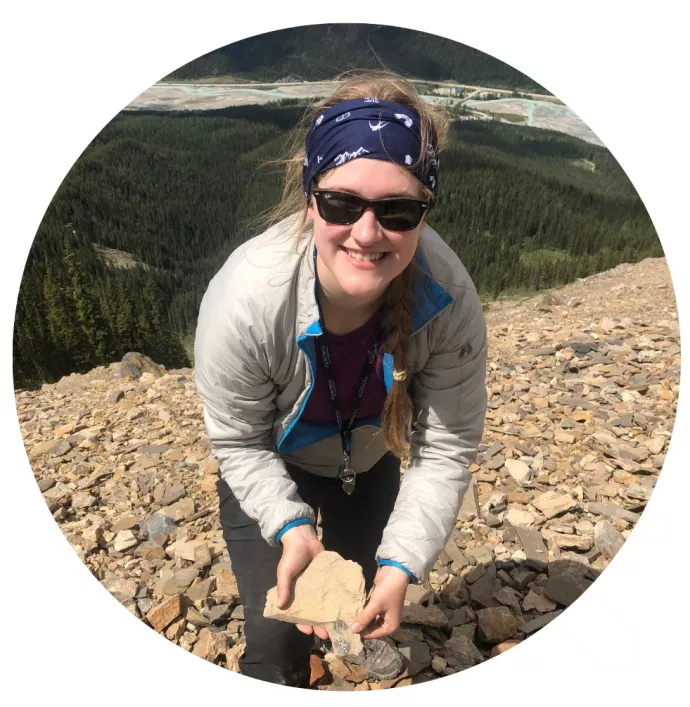
CPS Grad Spotlight - Katie Maloney
Name: Katie Maloney
MSc or PhD Candidate: PhD Candidate
Location of Undergraduate Education:
HBSc Integrated Science with a concentration in Earth and Environmental Science, McMaster University
Name of the Lab at CPS: Laflamme Lab
Selected Awards:
UTM Graduate Student Leadership Award
NSERC Postdoctoral Fellowship
Chemical and Physical Sciences Department Best Paper Award
Geological Association of Canada Eric Mountjoy Exchange Grant
NSERC Postgraduate Scholarships-Doctoral
Selected Research Contributions: https://scholar.google.com/citations?hl=en&user=H7U-lLYAAAAJ&view_op=list_works&sortby=pubdate
Katie, please tell us about yourself and your journey as a PhD Candidate!
How did you come to UTM? What interested you to join a lab here?
I came to UTM for my MSc to utilise my sedimentology experience to tackle questions about ancient fossils, specifically the first large complex life the Ediacara Biota in southern Namibia. My background was studying the rock record and modern glacial environments. When I started working with Marc Laflamme, I became fascinated by the evolution of ancient life and rocks that provide clues to how the Earth’s ecosystems have dramatically changed over time.
When did you realize that you wanted to pursue a graduate study?
I started my undergrad thinking I wanted to be a doctor. Then in my second year, I had an opportunity to go to Iceland where I learned that there are so many unanswered questions about the processes that have shaped our planet. Mentorship shaped my undergraduate experience and led me to graduate school, which is why I want to inspire new generations of geoscientists through mentorship and outreach.
What are your research interests? Tell us few exciting things about your research.
I search for clues in the rock record to help us understand ancient life. I am currently studying ancient seaweed forests that started changing the chemistry of our oceans almost 1 billion years ago. These photosynthesizing organisms were no bigger than a pencil lead and yet they play an important role in making the oceans a nice place to live (e.g. habitable) for more complex life to thrive. These organisms are among the oldest and largest known green macroalgae and can teach us important lessons about evolution during climate change, which will aid in addressing modern challenges related to sustainability and biodiversity.
Finding these fossils is tricky because they are fragile like modern seaweed and rarely preserved over millions of years, little on billions of years. My most recent publication dives into why these organisms are preserved in specific environments by identifying the processes that aid in their fossilization (Maloney et al., 2022; Scientific Reports; supported by the CPS Graduate Research Visit Program). This research can help us guide our future searches for fossils when we return to the Yukon this summer.
What is your goal when you finish your degree?
I would like to have a career in geoscience research and teaching with an emphasis on interdisciplinary science education and outreach at a university, museum or national park. I am invested in reducing barriers to geoscience education by promoting field safety leadership, mentoring students, leading outreach, and creating an inclusive environment with accessible experiential learning opportunities.
What are some of your achievements you'd like to share?
I am proud of creating Unlearning Racism in the Chemical and Physical Sciences (U-R-CPS based on Unlearning Racism in Geosciences; URGE) with my friends Matthew Tung and Seshu Iyengar to provide a space for CPS students to learn about racism and develop anti-racists policies. This program has resulted in several exciting initiatives with help from our department leadership and graduate support including the Speaking Our Truths: The Journey Towards Reconciliation workshops and the development of group norms in a code of conduct.
In addition, I have enjoyed watching the students I have taught in the lab and field become excited about geoscience and graduate to have their own successful careers.
Do you have any advice for students considering to pursue graduate studies in research?
Be curious and open to unexpected opportunities! It takes time to figure out what you enjoy doing, so don’t put too much pressure on yourself to get it right the first time. Instead, try lots of different experiences to find what makes you excited and fits best with your skills and goals.
